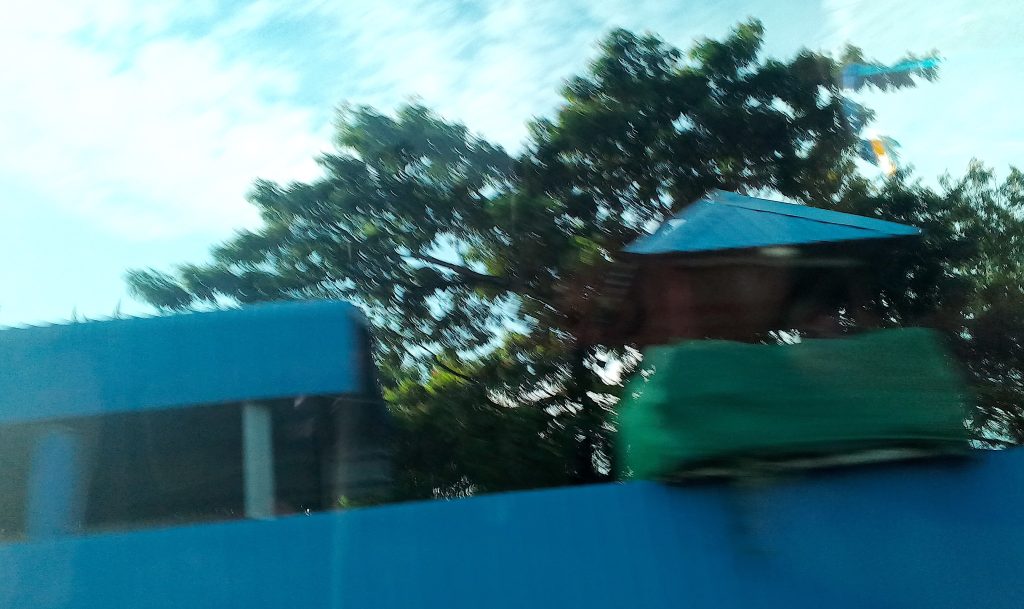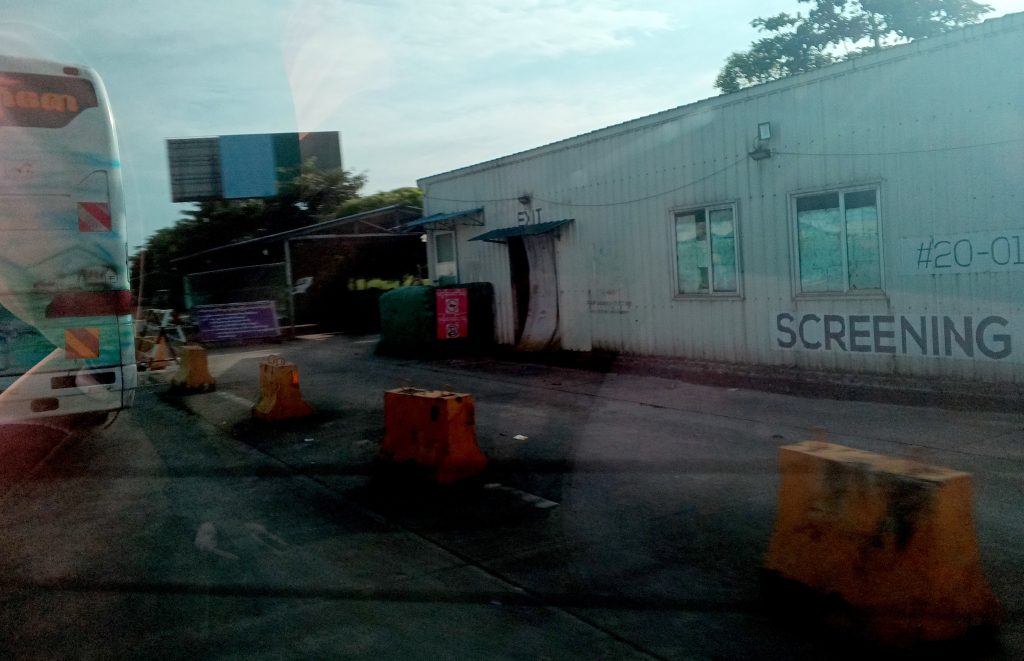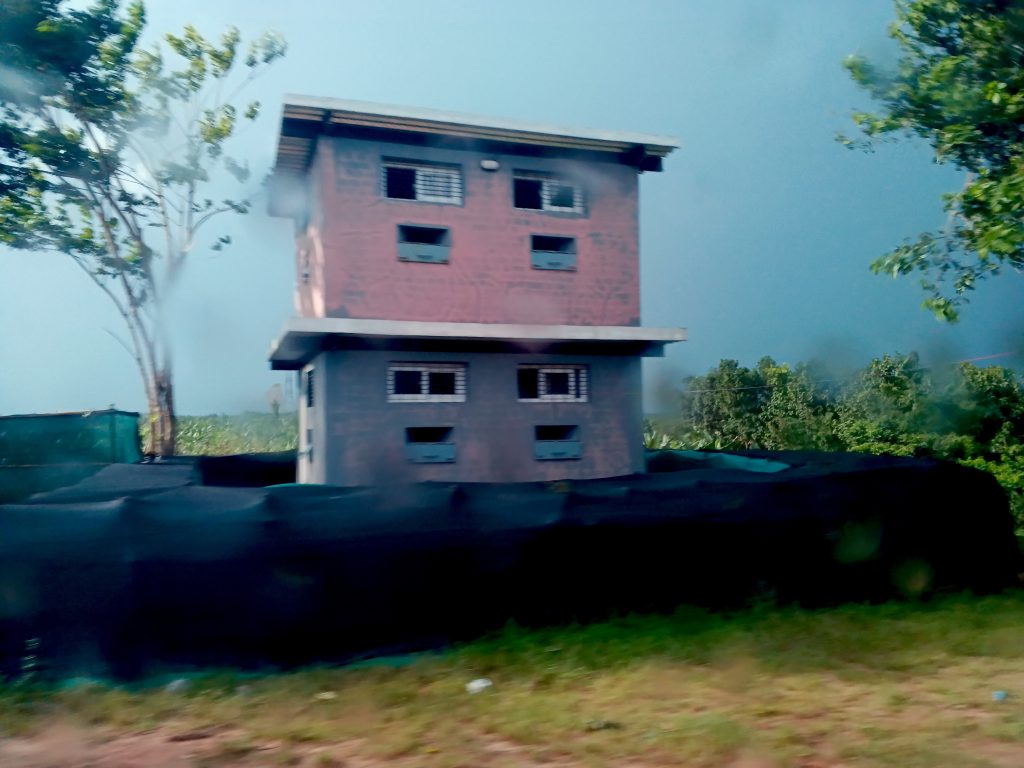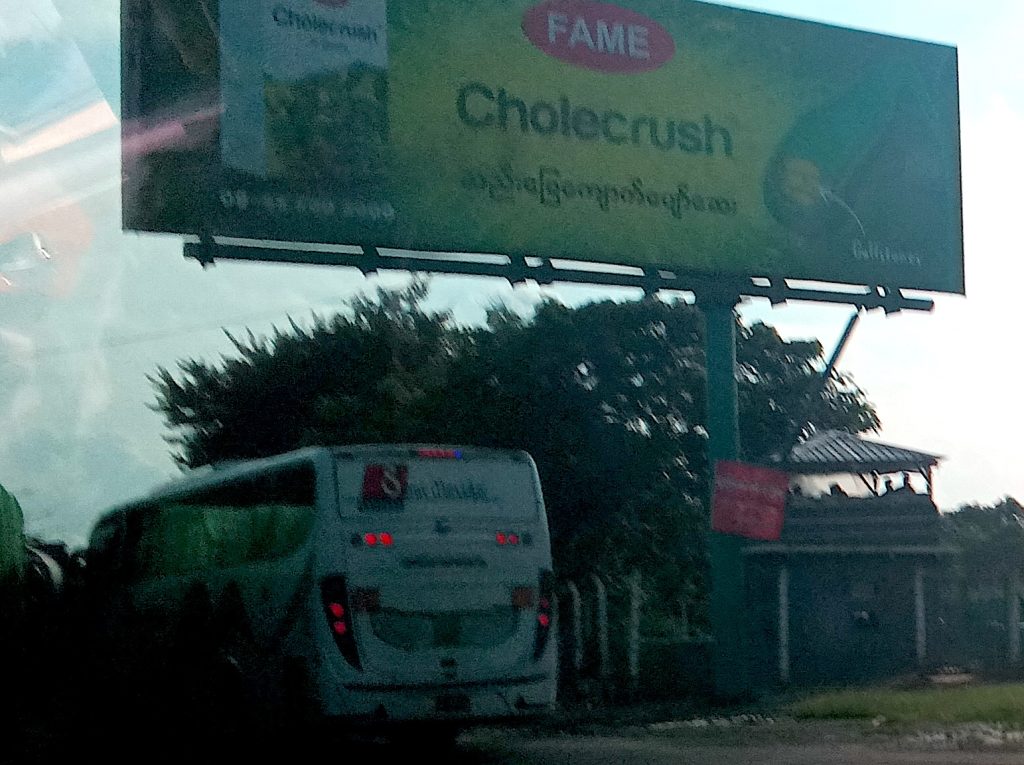Checkpoints // Myanmar Map of Lawlessness
In the unfolding reality after the February 2021 coup, police stations and military buildings are now protected by ramshackle palisades – sharp bamboo spikes that have been imposed over the original fences and boundaries. In former times the occupants of these buildings claimed to protect the population, a bold façade supported by the discomfiting uppercase “MAY I HELP YOU” emblazoned across public entrances. Yet since the February 1st, 2021 coup, nearly 5000 citizens have died at their hands.
By YGN102
Shoddy concrete structures connected to the military have become a common and menacing sight in Myanmar. Cropping up along the sides of roads, supported by sandbags and bordered by barbed wire, some of these structures are formidable forts and yet others are far smaller, held together shabbily by recycled green shade cloth. They all have small, rectangular openings from which firearms can protrude. These pillboxes are being used by the military as watchtowers and strongholds from which they can erratically impose invasive checks on civilians, subjecting them to bullying, intimidation and arbitrary arrest.
Similarly, interrogation gates have been positioned at the entrances to cities, beside highways, and near famous places. Security forces stop civilians for interrogation, and grounds for arrest include simply when soldiers perceive a lack of deference or respect.
U Naing* experienced this firsthand. According to his lawyer, “He was taken to the interrogation centre for talking arrogantly to the police while they searched his phone. Everyone has been involved in the revolution at some point after the coup, and the police discovered from his phone that U Naing had once spoken out about it. It didn’t matter that he had deleted the posts – everything he had deleted was restored when the police checked his phone with a special app.”
The procedure at checkpoints is unpredictable, but typically includes the close scrutiny of national ID cards, followed by demands to see a person’s phone, whereby security forces will trawl through the person’s photos and Facebook account. In the early days of the coup, it was commonplace for people to post photos of the demonstrations taking place in the streets. Ko Myo*, who often travelled to and from Sagaing Region and Chin State for work, reported that if the military found posts of participation in protests, or even pictures of Daw Aung San Suu Kyi, the ousted democratic leader, he would be beaten and arrested at once.
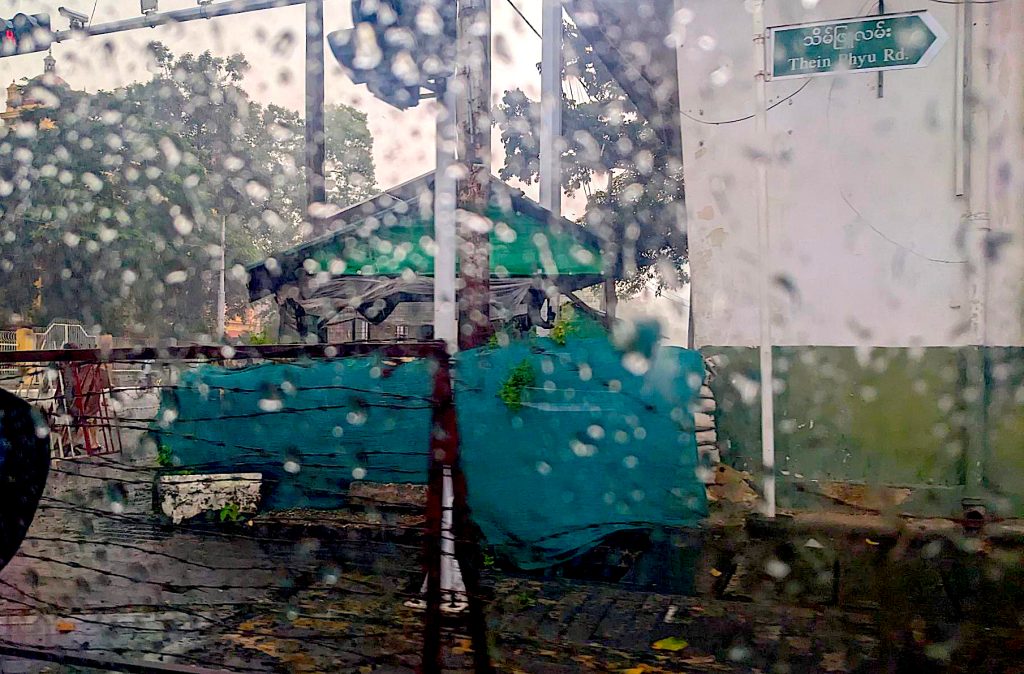
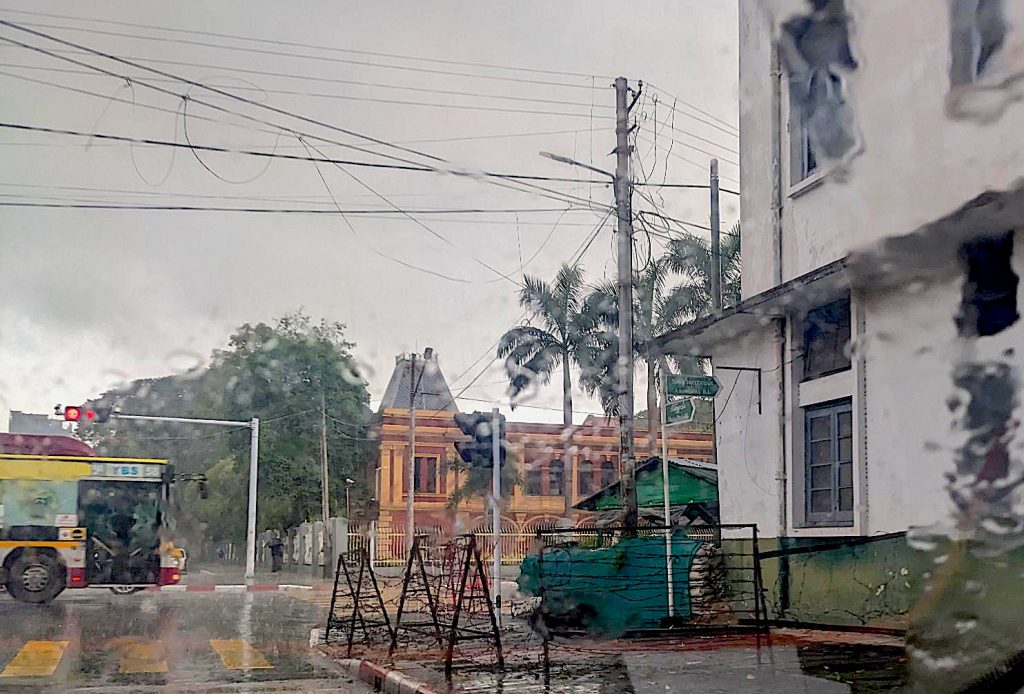
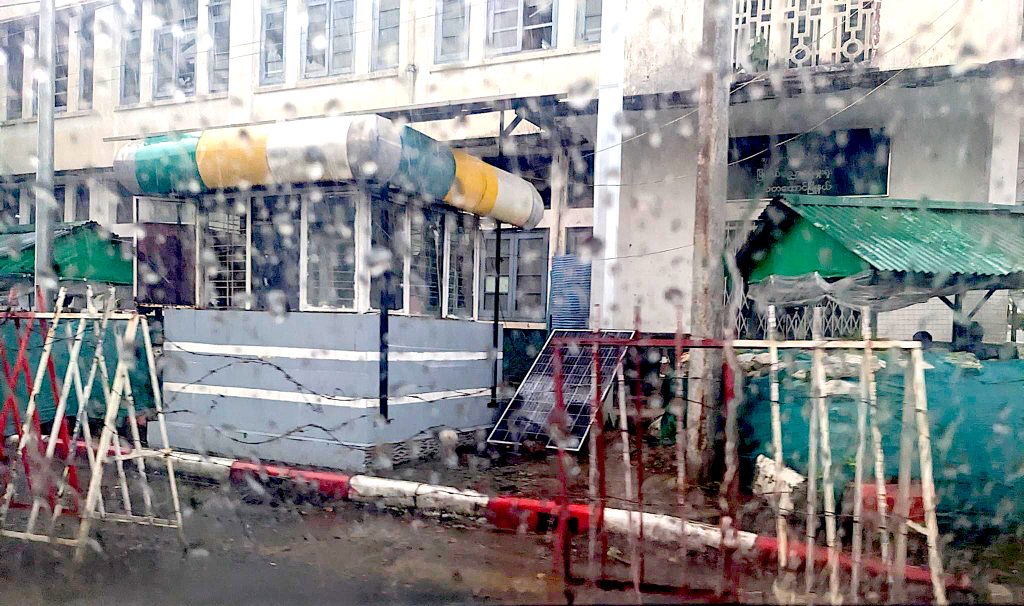
Our interviewees have predominantly recounted their experiences with junta-controlled checkpoints and interrogation gates. However, civilians are likewise subject to controls imposed by other groups. Ethnic Armed Organizations and People’s Defence Forces have their own checkpoints and ways of doing things, which are also unpredictable, and on occasions, violent.
“At PDF checkpoints it is generally okay if you can explain your situation well. But at the checkpoints of the EAOs, if you told them that you did not have a wife and they then found family photos in your phone, you would be beaten. At the junta’s checkpoints, they demand travellers report what they were asked at the EAO checkpoints,” said Ko Myo*, recounting his own experiences of these multiple forms of control.
During a checkpoint investigation, the junta discovered a politically-charged photo on the phone of Ko Myo’s* friend. He was then beaten, arrested and sentenced to two years in prison.
Checkpoints pose a heightened risk of gender-based violence. “At a checkpoint in the mountains, a single woman was once investigated, and it was discovered later that the security forces made her stay at the gate. At a checkpoint in Myaing, the junta forced a woman to kiss them. They demanded her phone number and called her incessantly in the middle of the night”, Ko Myo* said. These accounts, and many others, are starting to come to light about a junta that has an already repugnant track record of barbaric and sexualized violence against women of non-Bamar ethnicities throughout decades of civil war.
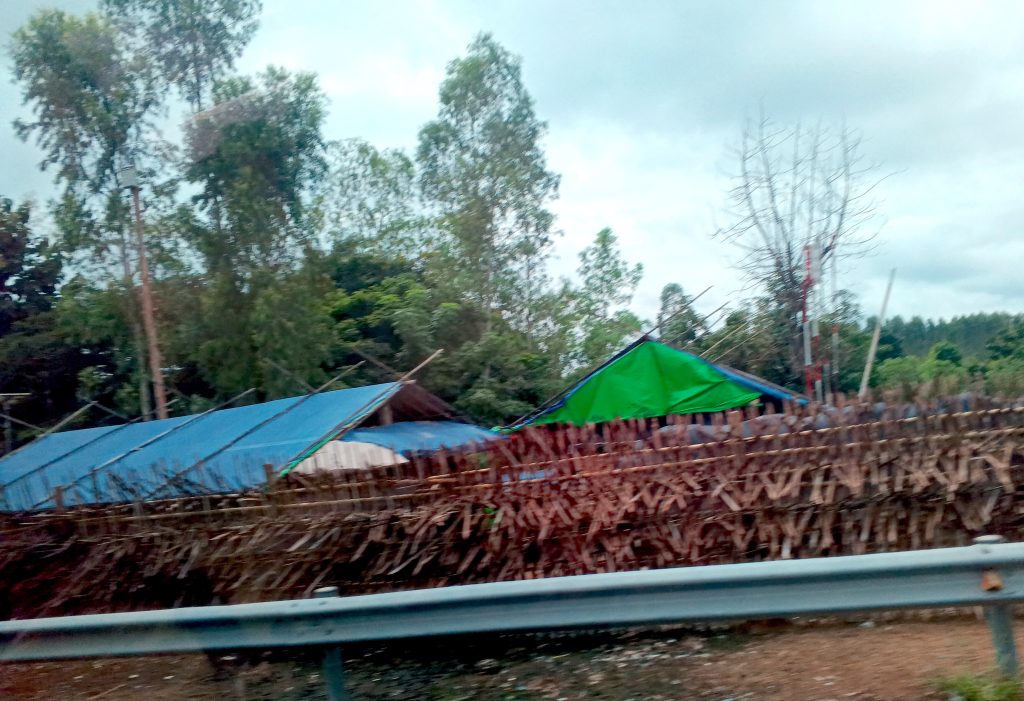
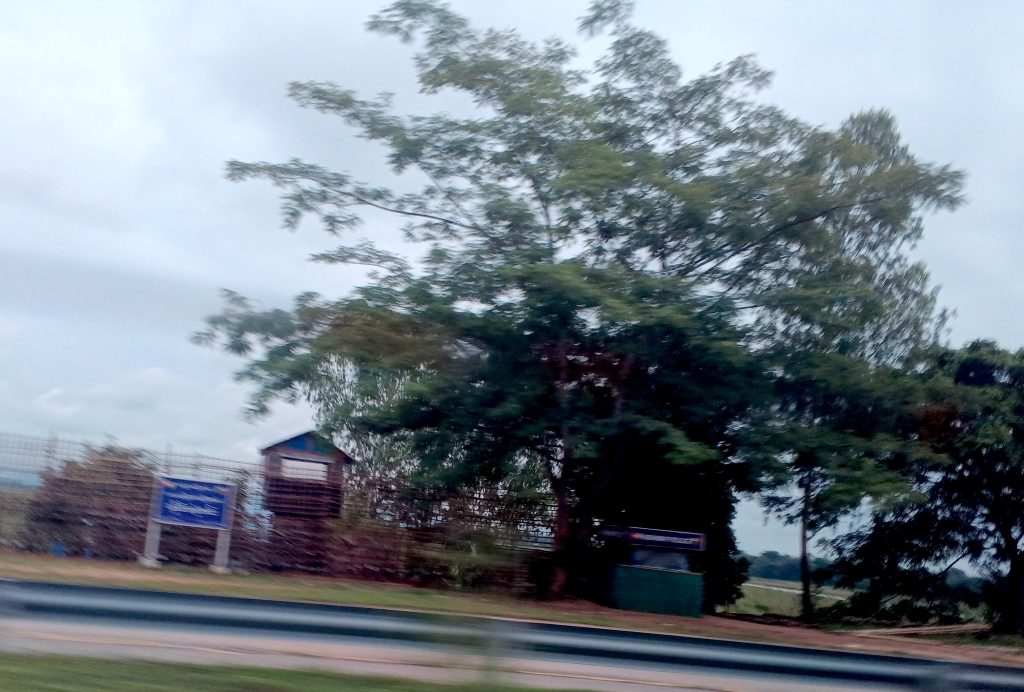
According to an express bus driver, the main targets of the forces at the checkpoints are young people. If a young person goes on a trip without their national ID card, they face far greater risk of extended interrogation. Even when no legitimate accusations can be made against them, they are still liable to pay a bribe, ranging from 10,000 to 100,000 kyats.
With an adequate bribe offered early enough it can be possible to dodge investigation. However, for individuals already known to the military for political activities, the stakes are high. It is exceptionally difficult to avoid interrogation and arrest, although a lawyer that we spoke to indicated that it is possible under some circumstances, if a high enough bribe is on offer.
It is not simple. “One of my clients could not get away from them as he was alleged to have had previous anti-coup political involvement. His cash, his car, and all the jewellery he had with him at the time of arrest were lost. But he was not beaten up, fortunately”, as stated by a lawyer in Yangon, speaking on condition of anonymity. “Another man managed to escape by offering two cars he owned as a bribe.”
Signs at checkpoints proclaim, “You can file a complaint if asked for a bribe. Both parties will be prosecuted when bribery is detected.” Despite this, people report having been asked for bribes yet haven’t dared to file a complaint due to fear of the consequences.
The pandemic was used to justify the creation of the security gates in 2020, when travellers were made to pass Covid tests before they could exit or enter cities. Nowadays, these same gates are pivotal in the junta’s active repression of civilians. The military council does not remove checkpoints, even when they are attacked or bombed, or when there are fatalities on their side. Checkpoints are only ever reinforced, strengthened, updated, reconstructed – and interrogations continue.
A checkpoint in Hakha, Chin State, is attacked or bombed multiple times. Right after each explosion, the military rushes to reinforce and strengthen it, and the junta doubles down on its investigations of vehicles, according to Ko Zaw Tun*, who passes often through the Hakha checkpoints. There are five to ten personnel at every checkpoint on average, however, the bigger the checkpoint, the more reinforced it is, and the more personnel there are, entrenched in layers of bamboo, wood, concrete, empty containers – whatever is at hand.
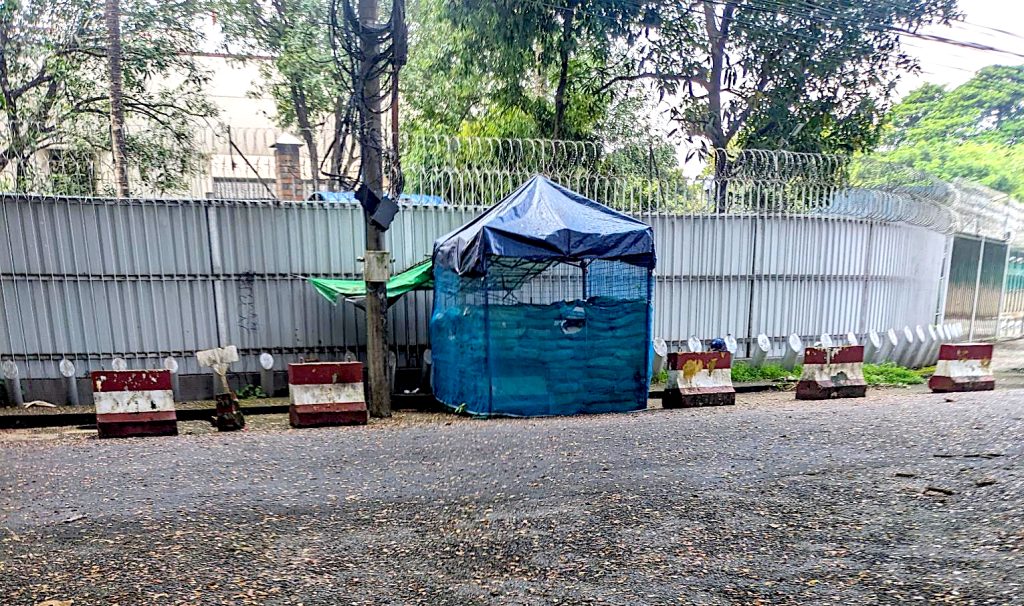
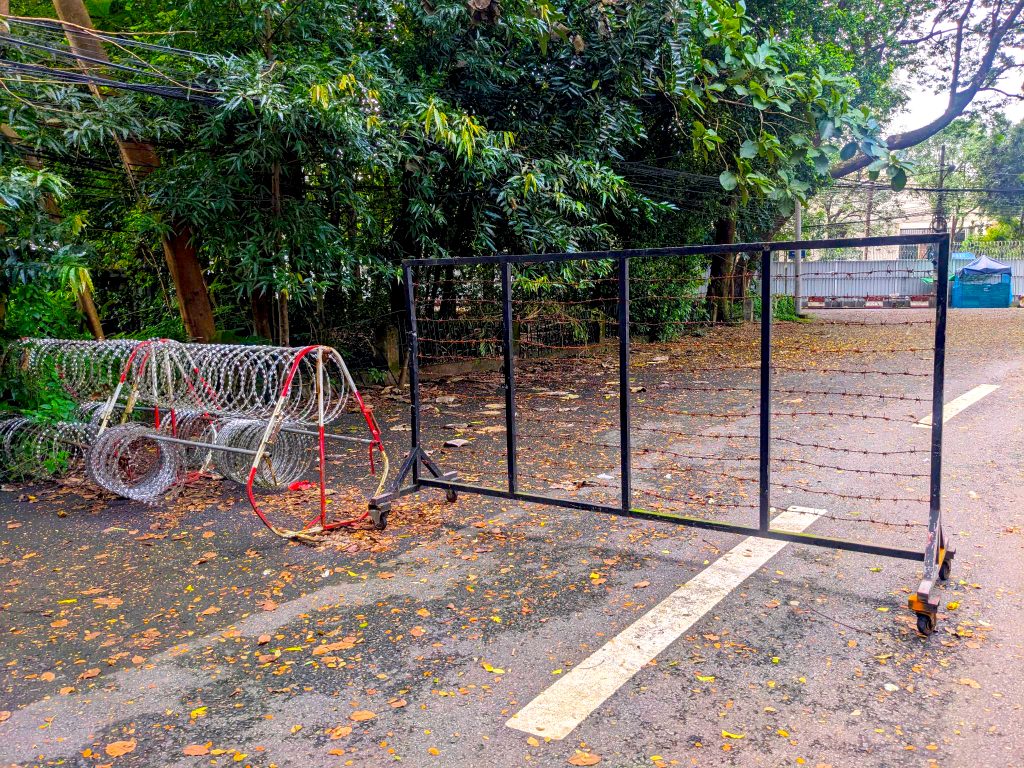
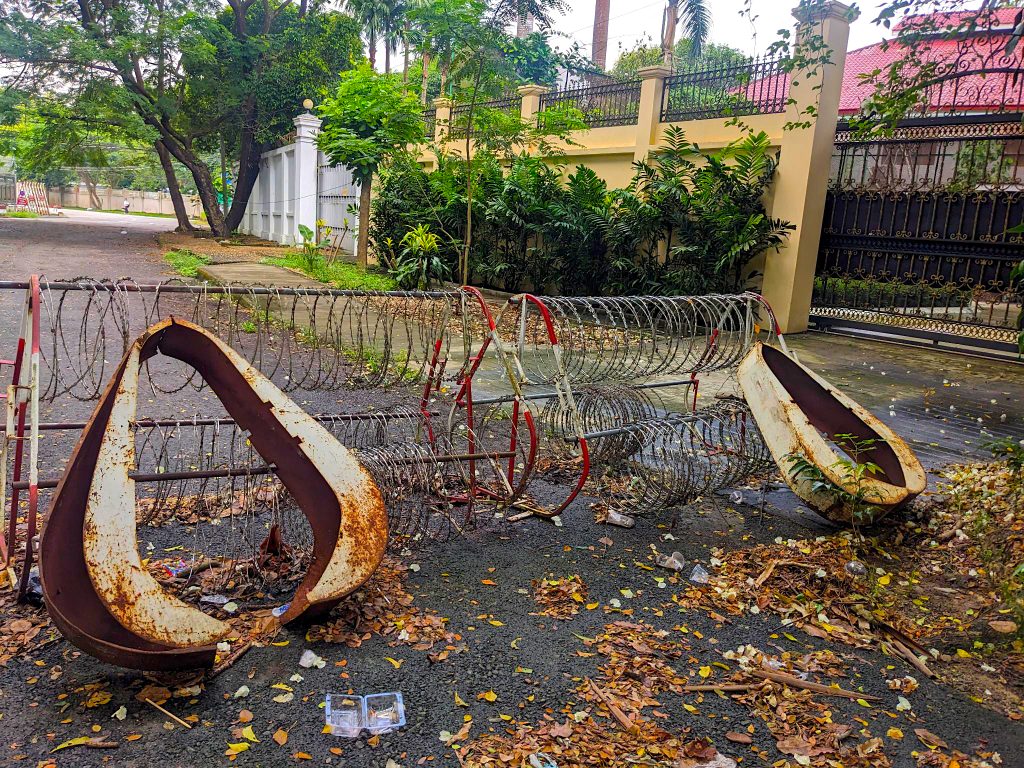
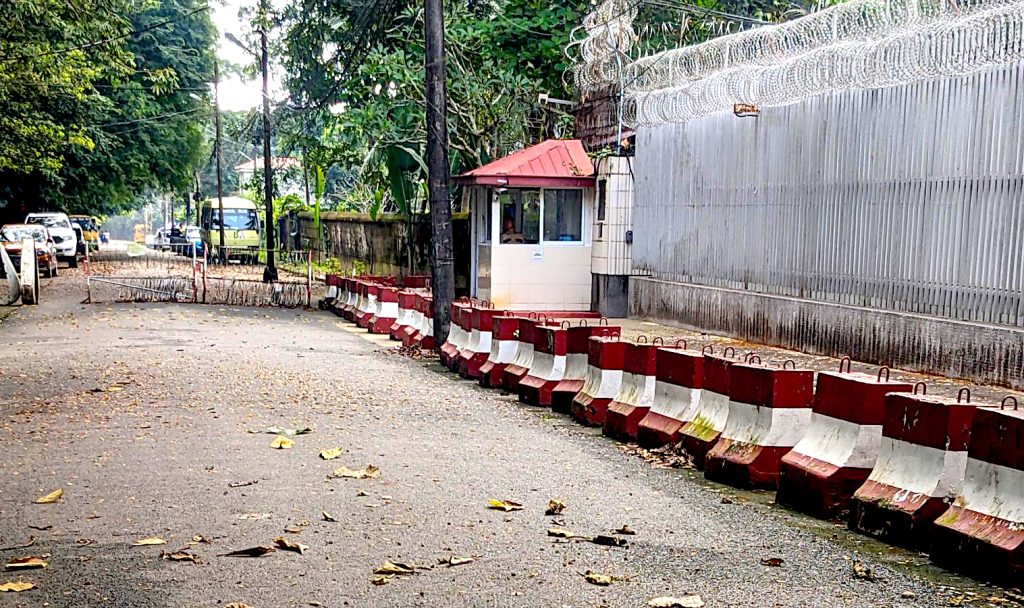
Security in front of the Russian embassy in Yangon
Ko Myo*, whose job requires travel within the country, is deeply afraid of the smartphone checks at the security gates. He was asked to provide a background check one day and couldn’t sleep at night, worrying that they could come to his house and arrest him at any time.
The military’s primary demands are to see National ID cards and smartphones. Without an ID, interrogations can be lengthy. The bearers of national ID cards beginning with 5- (Sagaing Region) or 8- (Magway Region) are subject to more rigorous interrogation, as these regions put up the strongest resistance to the military.
“Investigations are stricter in small towns such as Yaw, Saw and Pakokku, where the resistance to the junta is strong in comparison to urban areas. It’s also a problem if you have your phone in hand at a checkpoint. You have to put the phone in your luggage or something. There have been cases in which smartphones were confiscated”, says Ko Phyo Aung*, a merchant who travels around the country.
“Delete all things related to political issues in your phone because it can harm your life. Buy a new phone if it’s possible. Do not use any of your previous accounts”, lawyer Daw Thiri* advises. Offering counsel to political prisoners, she says many people are now in jail, charged with all manner of offences, after having been detained at checkpoints for failure to produce ID or for failing a phone inspection and having been found to have allegedly spoken out against the junta.
Life at the checkpoint is uncertain. Some people are detained, while others pass easily through.
“Ethnic people are often asked if they are foreigners. Then they are asked for a bribe. It delays the journey as every passenger on the express bus has to get out for the security check when there’s a checkpoint. But in some cases the vehicle is not investigated when the driver gives them a bribe”, confides Ma Mi Suu*, who often travels to Ayeyarwaddy Region on business.
Our team interviewed a Burmese woman who recently travelled to Myawaddy. Before the coup, Ma Thandar* was not aware of digital security and didn’t care about disclosing her birthdate or home address. After the coup, she has learned a lot about digital security. She follows the news about the revolution closely. Each time she travels, she deletes various apps: Facebook, Signal, Telegram. Some apps allow for the backing up of data, but some, like Signal, don’t, so she loses data every time she travels. This is not to mention the burden of storing useful data for navigation ahead of each trip, due to the regular, often targeted, internet cuts faced in rural areas.
For a vehicle to pass through a checkpoint, the ID cards of every passenger must be presented for checking and cross-checking. Ma Thandar’s* bus ride from Yangon to Myawaddy took nine hours and passed through five checkpoints. At each of them, she and all the other forty passengers were made to show their ID cards and their mobile phones. The officers were especially stringent at Hpa-An, the capital of Kayin State.
The passengers climbed off the bus and filed into the interrogations tent. Six officers were checking phones for photo histories and Facebook accounts.
“If you have photos related to politics, the Spring Revolution, or even a shared Facebook post, you will be in trouble and won’t be allowed to leave.”
In addition to photos and FB, people with online gaming software were subject to intense scrutiny, possibly as a result of increased awareness of online scamming involving Myanmar nationals in the border town of Shwe Kokko and Tachileik facing Thailand.
Some disquieted passengers were eager to speak up before they were called, to assure officers of their innocence in political matters.
Ma Thandar* said she switches between 5 SIM cards for different functions: one for online payments, another for personal matters, and so on. “Travelling is extremely tiring these days. I often stay up the whole night before the trip to clear my devices. I lose my data every time I travel.” She concedes that it would be safer and much more convenient to have two mobile phones, in order to take ‘the clean’ one for travel and the other to “really use”, and to follow the revolution.
Cases that can be prosecuted with the Anti-Terrorism Act include involvement in the revolution, possession of explosive weapons, connection to the People’s Defence Forces (PDFs), withholding information about PDFs, allowing PDFs temporary stay, and making donation for PDFs, etc.
“Someone may say your name during an interrogation at any point. If that happens, your house will be seized by the military and sealed. Almost everyone has done something the military perceives as resistance, so they could find some evidence against you. Do not leave evidence in your phone. Delete everything related,” advises lawyer Daw Thiri*.
She continues, “There are people who have given away everything they own to avoid being arrested because they are involved in revolutionary movements. Then, those military officials who conduct investigations profit from it and get rich.”
Checkpoints continue to appear, particularly in urban areas, as the military attacks civilians with increasingly absurd interpretations of law. They threaten people carte blanche with any section they like, raising revenue for themselves in the process.
* All names used in this article are pseudonyms, with the exception of Daw Aung San Suu Kyi
© All pictures used in this article are by Visual Rebellion team members & local sources
# This story was produced following a workshop by Myanmar Witness and supported by the 'Staying Resilient Amidst Multiple Crises in Southeast Asia initiative' of SEA Junction in partnership with CMB Foundation.
